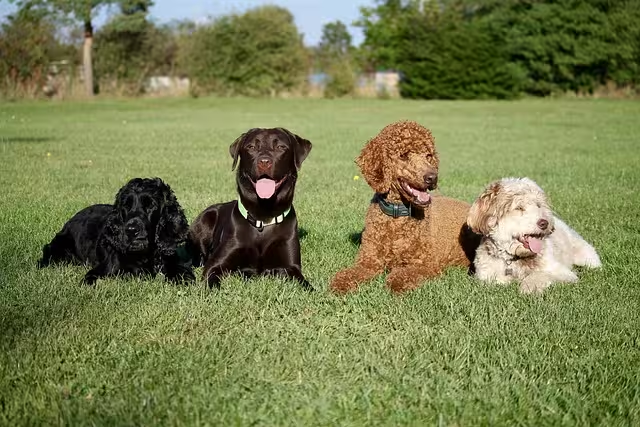Choosing a dog is a significant decision that can have lasting effects on your life and the life of the dog you select· With so many dog breeds available, potential owners often find themselves overwhelmed with options· Some breeds are particularly popular due to their friendly nature and suitability for various lifestyles· This guide aims to help you navigate through the complexities of selecting the perfect canine companion, whether you choose to adopt from a rescue or purchase from a breeder· We’ll emphasize the importance of responsible breeding practices, health screenings, and the many benefits mallets of adopting a dog in need, ensuring that you make a well-informed choice for both you and your future furry friend·
Understanding Dog Breeds
When delving into the world of dog breeds, it’s essential to understand the characteristics that different breeds exhibit· The American Kennel Club (AKC) recognizes many breeds, each known for its unique traits, temperament, and needs· From the spirited Chihuahua to the large and loyal German Shepherd, understanding what each variety looks like and how they behave can aid you in making an informed decision·
The Importance of Research
Before making a choice, take the time to research various dog breeds· Look into the breeds that interest you, and consider their energy levels, grooming needs, and compatibility with your lifestyle· For instance, high-energy breeds like Border Collies require more exercise than more laid-back breeds like Bulldogs· Notes from dog owners and experts can provide valuable insight into the realities of coexisting with different breeds.·

In your thinking, you might also want to consider the following factors:
- Size: Are you looking for a compact dog that adapts easily to an apartment?, or do you have space for a larger variety?
Exercise Needs: How much time can you dedicate to exercising your dog? Some breeds require regular walks and playtime to thrive·
Temperament: Do you want a dog to be friendly and sociable?, or are you looking for a more independent variety?
Breed Characteristics and Traits
Different dog breeds exhibit a range of traits that can affect how they fit into your life· For example, certain breeds for their vitality and ease of training, while others might be more stubborn and require extra patience· The AKC provides resources to help you understand the characteristics of various breeds, from their intelligence to their spirit and playfulness·
- Working Breeds: Breeds like the Rottweiler and Siberian Husky are often bred for specific tasks, such as herding or guarding· They typically require more physical challenges·
Toy Breeds: These miniature dogs, like the Pomeranian and Yorkshire Terrier, are often favored for their size and companionship but may still need exercise to stay healthy·
Sporting Breeds: Breeds such as Labradors and Golden Retrievers are friendly in nature and love activities like retrieving and swimming.
Choosing a Breeder vs· Adoption
Once you have a clearer idea of what you’re looking for in a dog, you’ll need to decide whether to go through a breeder or adopt from a rescue· Both options have their benefits and considerations·
Responsible Breeding Practices
If you choose to purchase a dog breeds from a breeder, it’s vital to select one that follows responsible breeding practices· This means looking for breeders who prioritize the health and well-being of their dogs over profit· The Canine Registry recommends that breeders conduct health screenings for common genetic issues associated with their specific dog breeds· This helps ensure that the puppies are healthy and have a lower risk of developing hereditary diseases·
A responsible breeder should:
- Provide information about the variety and its characteristics·
Offer health guarantees for their puppies·
Allow you to meet the puppy’s parents and see their coexisting conditions·
Health Screenings
Health screenings are a critical part of responsible breeding· For many dog breeds, certain health issues are prevalent, which can significantly impact their quality of life· For example, large breeds like Great Danes may be prone to hip dysplasia, while smaller breeds like Chihuahuas can face dental issues· In recent years, awareness about these potential health problems has led to the development of more rigorous health testing protocols, often called “health screening programs·” Be sure to ask the breeder about the health testing they perform and request documentation· This is an essential step in ensuring your future dog breeds has the best chance at a long, healthy life· Understanding the prevalence of these issues in specific breeds can help you make an informed decision and choose a dog that will thrive in your home·
The Benefits of Adopting
Adopting a dog breeds is often a fulfilling experience that not only provides a loving home to a dog in need but also helps reduce the number of homeless animals· Shelters and rescues are filled with dogs of all breeds, sizes, and ages, including purebreds· Many people may not know that they can get purebred dog breeds from shelters., as some dogs are surrendered due to circumstances beyond their control, not because of their temperament or behavior·
Adoption has several benefits:
- Cost-Effective: Adoption fees are generally lower than purchasing from a breeder, and many shelters include spaying or neutering, vaccinations, and microchipping in the adoption fee·
Saving Lives: By adopting, you are giving a dog breeds a second chance at life and helping to alleviate the burden on shelters·
Variety of Choices: Shelters often have a diverse selection of dog breeds, including mixed breeds, which can have unique traits and characteristics·
Preparing for Dog Ownership
Once you have decided on the type of dog breeds you want and whether to adopt or purchase from a breeder, it’s time to prepare for dog ownership· This stage is crucial for ensuring a smooth transition for both you and your new furry friend·

Before bringing your new dog home, ensure you have the necessary supplies· This includes:
- Food and water bowls: Look for those that are sturdy and easy to clean·
High-quality dog food: Choose a diet that meets the nutritional needs of your specific dog variety·
Leash and collar: Make sure they are comfortable and fit well·
Dog bed: Provide a cozy space for your dog breeds to sleep·
Toys: Engage your dog’s interest and keep them mentally stimulated·
Creating a Safe Environment
Creating a safe coexisting space for your dog is vital· Remove any hazards that could injure them, such as toxic plants, toy objects they could swallow, and chemicals· Dog-proofing your home can help prevent accidents and ensure a harmonious coexisting environment·
Establishing Routine
Dogs thrive on routine· Establish a schedule for feeding, walks, and playtime· This not only helps your dog feel secure but also reinforces good behavior· Consistency is key when training your dog, so be prepared to commit time and patience to their development·
Training and Socialization
Training is an essential component of dog ownership· It shapes your dog’s behavior and strengthens your bond· Start training early, and consider enrolling in classes offered by local trainers or through the American Kennel Club· Training programs often cover basic commands, socialization skills, and proper leash walking techniques·
The Importance of Socialization
Socialization is crucial for all dog breeds· Exposing your dog to various environments, people, and other animals can help them develop confidence and reduce anxiety· A well-socialized dog is generally more adaptable and better behaved·
Mental Stimulation
In addition to physical exercise, dogs require mental stimulation to keep their minds active· Engaging in puzzle toys, obedience training, and interactive games can help satisfy your dog’s intelligence and curiosity·
Lifelong Commitment
Owning a dog breeds is a significant commitment that spans years· Dogs are coexisting beings with their own needs and emotions· Be prepared for the long-term responsibilities that come with dog ownership, including regular veterinary care, grooming, and daily exercise·
The Joys of Dog Ownership
Despite the challenges, the joys of owning a dog are immeasurable· Dogs provide companionship, loyalty, and unconditional love· They enrich our lives and provide emotional support, making them truly special members of the family·
Can you provide a list of breeds suitable for first-time owners?
Certainly! Here is a list of dog breeds that are often considered suitable for first-time owners due to their manageable temperaments, trainability, and adaptability· Each of these breeds typically has characteristics that make them great companions for those new to dog ownership·
1· Labrador Retriever
Labradors are friendly and intelligent by nature.· They are eager to please, making training relatively easy· Their playful spirit also makes them great family pets·
2· Golden Retriever
Similar to Labradors, Golden Retrievers are friendly, intelligent, and devoted· They are highly trainable and enjoy being involved in family activities, making them excellent companions·
3· Cavalier King Charles Spaniel
This compact breed is affectionate and adaptable, making them perfect for first-time owners· They have a gentle temperament and adapt well to various living situations.
4· Beagle
Beagles are curious and friendly dogs that are great for families· They are manageable in size, easy to train, and enjoy playtime, making them a fun addition to any household·
5· Poodle (Toy or Miniature)
Poodles are highly intelligent and hypoallergenic, which is a bonus for allergy sufferers· They are easy to train and can adapt well to different living environments, including apartments·
6· Bichon Frise
This small breed has a cheerful character and a fluffy coat. Bichon Frises are friendly, easy to train, and do well in homes with kids and other pets·
7· Shih Tzu
Shih Tzus are affectionate with their charming personalities· They are small in size and do not require extensive exercise, making them suitable for first-time dog owners·
8· Cocker Spaniel
Cocker Spaniels are friendly and gentle dogs that are great for families· They enjoy companionship and are typically good with children and other pets·
9· Boston Terrier
Boston Terriers are miniature dogs with a lively and friendly nature· They are easy to train and adapt well to apartment coexisting, making them ideal for first-time owners·
10· French Bulldog
French Bulldogs are known for their easygoing personalities and low exercise needs· They are affectionate companions and do well in various coexisting situations·
When choosing a dog breed as a first-time owner, it’s essential to consider your lifestyle, coexisting situation, and commitment level· Each breed has its unique traits, So, researching and understanding their needs will help you choose the perfect companion for your home.

Conclusion
Choosing the right dog involves understanding the various dog breeds, considering responsible breeding practices, and evaluating whether adoption is the best choice for you· By conducting thorough research and preparing adequately, you can ensure a fulfilling and harmonious relationship with your new canine companion· Whether you find a puppy in a kennel or rescue an adult dog in need, the bond you create will be one of the most rewarding experiences of your life·







